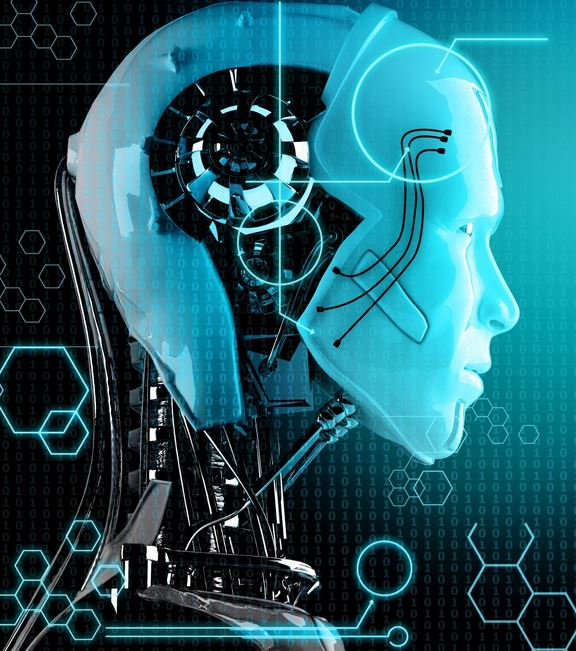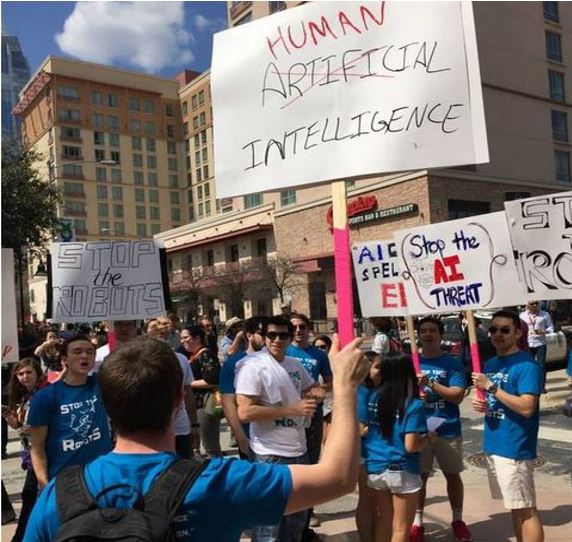Smart robots will replace most human workers, thus creating mass unemployment globally and the disconcerting social and psychological consequences that will come with such an unprecedented and rapid change. Who knows what a world with billions of jobless people of working age will be like?
The change – robots replacing us in the workplace – is already underway and accelerating, and will lead to more than 50% of the world’s potentially active population having no job. Computer scientist Moshe Vardi says this will happen earlier than we think – probably within the next thirty years.
Our potentially active or working-age population refers to men and women aged from about 18 to 65.
Not only will intelligent robots be able to do most of the jobs humans currently do, they will probably out-perform us too.
How will we be able to compete in the workplace against a device that never gets tired or angry, and if programmed correctly, is incapable of making mistakes.
Who will employers prefer, a super-clever robot – that does as it is told, does not demand a salary, will never sexually harass other workers resulting in potentially ultra-expensive lawsuits, never demands time off after giving birth, is not affected by flu and other diseases which contribute to absenteeism, and doesn’t even need unemployment or health insurance – or a human?
Prepare for billions of people with nothing to do
Prof. Vardi, Distinguished Service Professor in Computational Engineering at Rice’s Department of Computer Science, says policymakers, psychologists, sociologists and other specialists urgently need to consider the societal implications of having the majority of its working-age population out of work, and a labour force dominated by intelligent machines.
What effect will an unemployment rate greater than 50% have on our communities? Will humans – who ever since our species was born have worked for food and shelter – thrive in a life of leisure?
 Robots replacing humans in the workplace is inevitable. Employers will choose machines that work non-stop, never make mistakes, and don’t ask for a salary, over any human worker. (Image: rand.org)
Robots replacing humans in the workplace is inevitable. Employers will choose machines that work non-stop, never make mistakes, and don’t ask for a salary, over any human worker. (Image: rand.org)
What will the effect be on our physical and mental health?
Our ancient ancestors started off as hunter gatherers or foragers; going out each day to hunt and pick fruits and other plants to eat. We then became farmers and tended to our cattle, other livestock and crops.
Since the industrial revolution we have all played a critical role in the division of labour as plumbers, machinists, electricians, mechanics, doctors, etc.
Aren’t we genetically programmed to work?
Hasn’t evolution genetically programmed us to be working creatures? How would the most intelligent animal on Earth cope with this drastic and rapid change? Any other dramatic change in evolution has occurred over a period of thousands or millions of years – this one will take just 30 years!
Regarding how humans and robots perform, Prof. Vardi, said:
“We are approaching a time when machines will be able to outperform humans at almost any task.”
“I believe that society needs to confront this question before it is upon us: If machines are capable of doing almost any work humans can do, what will humans do?”
 When the aristocracy dominated the top of society, many aristocrats never did a day’s work in their lives (idle rich). According to what we know, they thoroughly enjoyed it. Perhaps AI will give us all the opportunity to enjoy living like the landed gentry used to. (Image: nobility.org)
When the aristocracy dominated the top of society, many aristocrats never did a day’s work in their lives (idle rich). According to what we know, they thoroughly enjoyed it. Perhaps AI will give us all the opportunity to enjoy living like the landed gentry used to. (Image: nobility.org)
Prof. Vardi is making a presentation today at the annual meeting of the American Association for the Advancement of Science in Washington, D.C. on precisely this theme.
Will artificial intelligence be good for us?
Regarding the benefits and challenges of future artificial intelligence (AI), Prof. Vardi said:
“The question I want to put forward is, ‘Does the technology we are developing ultimately benefit mankind?’”
He has evidence that shows how rapidly AI is evolving. In fact, automation by robots and AI has already begun.
AI technologies today are already replacing middle-class jobs, and consequently exacerbating the growing income inequality problem. According to Dr. Vardi, each year humans will be replaced in the workplace at an accelerating rate.
Humans favour automation … for the moment
With the exception of the Luddites – skilled textile workers in the 19th century who protested against the introduction of machines – most of us have welcomed automation and believe it has improved our quality of life.
The belief that future advances in automation will be good for us still dominates, Prof. Vardi explains.
When we are asked about future robots and machines replacing us, Prof. Vardi comments:
“A typical answer is that if machines will do all our work, we will be free to pursue leisure activities.”
Prof. Vardi wonders whether AI is going in a direction that will ultimately benefit us, even if by some miracle we manage to reorganize our economies and societies to enable billions of humans of working age to live lives of leisure.
Prof. Vardi, who is clearly in the ‘work is good for us’ camp, said:
“I do not find this a promising future, as I do not find the prospect of leisure-only life appealing. I believe that work is essential to human well-being.”
“Humanity is about to face perhaps its greatest challenge ever, which is finding meaning in life after the end of ‘In the sweat of thy face shalt thou eat bread.’ We need to rise to the occasion and meet this challenge.”
 What does it mean when computer engineers and IT students are taking to the streets to warn us of the AI threat? (Image: facebook.com)
What does it mean when computer engineers and IT students are taking to the streets to warn us of the AI threat? (Image: facebook.com)
Even computer scientists expressing concern in public
A small demonstration – Stop the Robots – in May last year in Austin, Texas, was not filled with Luddites and technophobes. The majority of the demonstrators, including their leader, were engineering professionals or students from the University of Texas.
As the students walked down the street, they chanted “I say robot, you say no-bot!”
All the protesters were wearing T-shirts quoting Elon Musk’s warning “With artificial intelligence we’re summoning the demon.” Elon Musk, who designs rockets and makes electric cars, is no technophobe.
Mr. Musk once said:
“I think we should be very careful about artificial intelligence. If I had to guess at what our biggest existential threat is, it’s probably that. So we need to be very careful. I’m increasingly inclined to think that there should be some regulatory oversight, maybe at the national and international level, just to make sure that we don’t do something very foolish.”
“With artificial intelligence we are summoning the demon. In all those stories where there’s the guy with the pentagram and the holy water, it’s like – yeah, he’s sure he can control the demon. Doesn’t work out.”
Computer engineer, Adam Mason, who led the demonstration, said the protest was about morality in computing. He said many computer engineers and students are concerned about how fast technology is advancing and the risk of AI overrunning any type of human control in the near future.
Cambridge University to open new AI monitoring centre
The University of Cambridge in England is to open a new centre – The Leverhulme Centre for the Future of Intelligence – which will analyze current and future AI and determine whether it will be good for us, and if not, what we can do about it.
The Centre will be opened thanks to a donation of £10 million from the Leverhulme Trust. It will explore the opportunities and challenges that automation and AI will bring to us.
According to Cambridge computer engineers, even though AI and robotics is advancing super fast, we have only started scratching at the surface. Soon, smart robots will be able to analyse, learn and upgrade without our intervention, i.e. they will evolve on their own.
The Centre will employ computer engineers, AI specialists, psychologists, sociologists, philosophers, social scientists, anthropologists, and other experts to study and discuss the ethical, philosophical, technical and practical questions that artificial intelligence will raise in the future.
Director of the new Centre, Huw Price, the Bertrand Russell Professor of Philosophy at Cambridge, said regarding AI and what it will bring:
“Machine intelligence will be one of the defining themes of our century, and the challenges of ensuring that we make good use of its opportunities are ones we all face together.”
“Humans have barely begun to consider its ramifications – good or bad. The Centre is a response to the Leverhulme Trust’s call for ‘bold, disruptive thinking, capable of creating a step-change in our understanding.’”
Will robots be cleverer than us?
When will robots become more intelligent than humans and leave us behind in the evolutionary ladder? AI scientists say they are not sure – but they all agree it will definitely occur before the end of this century.
As soon as an artificial intelligence learns to upgrade itself without our help, its evolution will accelerate. It is likely that each upgrade will mean a bigger and bigger leap forward.
Eventually, an AI will reach a point where it is able to make judgements, and like all creatures on Earth, will have the will to survive.
Stephen Hawking’s view on AI
Prof. Stephen Hawking, the eminent theoretical physicist, says that AI is wonderful and has the potential to benefit us enormously. However, he warns that if we get it wrong, it could become a nightmare for humans.
We have to become prepared for the fact that AIs will be able to evolve much faster than we can biologically.
If we don’t set things up properly now, we risk AI ending civilization as we known it, and maybe even bringing about our extinction.
Prof. Hawking said:
“The development of full artificial intelligence could spell the end of the human race.”
“When it eventually does occur [AI becomes smarter than humans], it’s likely to be either the best or worst thing ever to happen to humanity, so there’s huge value in getting it right.”
